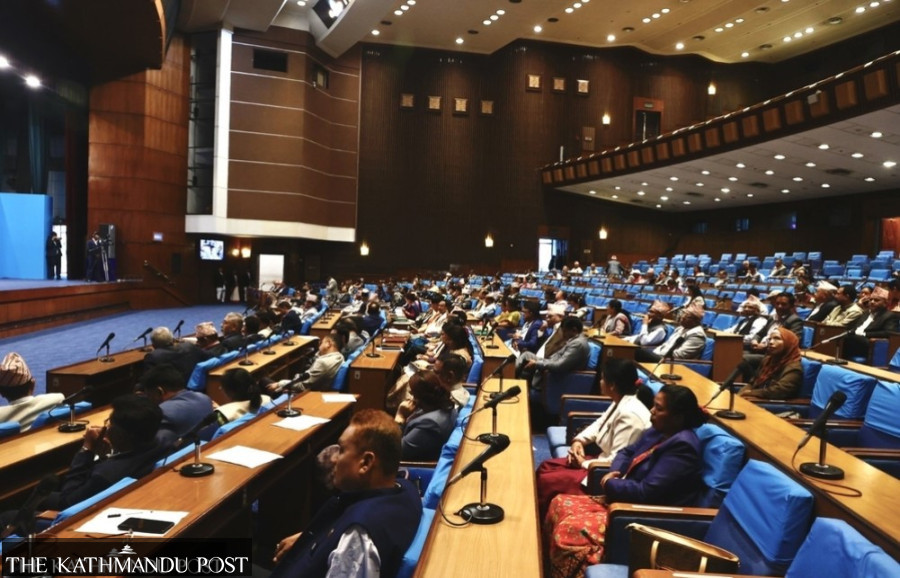National
Congress, UML leave House reinstatement option open
The reluctance of the erstwhile coalition partners casts doubt over the success of the March 5 elections.
Post Report
The reluctance of two of the three major parties to go to the polls has cast doubt over the success of the March 5 elections.
A day after CPN-UML chair KP Sharma Oli’s provocative statement not to accept the incumbent government and push for the reinstatement of the dissolved House of Representatives, the Nepali Congress has also decided to keep the reinstatement option open.
Most of the leaders in the meeting of the party’s incumbent and former office bearers argued that the Congress should take the agenda of House reinstatement together with participating in the elections.
Talking to media after the meeting, party spokesperson Prakash Sharan Mahat said that the option for reinstating the lower house should also be kept open as it is unsure whether the Sushila Karki government can hold the elections.
“The country would be pushed to uncertainty if the elections are not held. The door to reinstate Parliament, therefore, needs to be kept open,” he said. Putting forth their views in the meeting, Congress leaders including Shashank Koirala, Krishna Prasad Sitaula and Prakash Man Singh said they are not confident that the Sushila Karki-led interim government will hold the elections.
Reinstatement of the dissolved House is the only option left in that case, they said.
On September 12, President Ramchandra Paudel, on Karki’s recommendation, dissolved the lower house and announced the mid-term elections. Dissolution of the house was the major demand of the Gen Z representatives, whose movement on September 8 and 9 toppled the Oli-led coalition government.
Less than five months to go for the March 5 snap polls, the two largest parties—the Congress and the UML—are dragging their feet.
With an aim to hold the polls in a single phase, the Election Commission has come up with a detailed plan. It has announced all the dates except for candidacy nomination for the first-past-the-post polls and the enforcement of the election code of conduct.
“The commission strongly believes that all the parties will participate in the elections and contribute to its success,” said Ram Prasad Bhandari, acting chief election commissioner, adding the poll body will move ahead in close coordination and consultation with the parties.
Out of the 122 registered parties, the commission has invited 29, who have at least one elected representative from the previous general election, for the discussions on Thursday.
Even as the commission sounds optimistic, days ahead don’t look easy in bringing all the political parties to board.
“The current government is not on the path to conducting elections. It is rather pushing the country towards unnecessary bitterness, tension and confrontation,” said UML Deputy General Secretary Pradeep Gyawali. He said the move of the Karki government to release those who brutally kill police officers and loot weapons but obstructing the peaceful assembly shows its intention.
The Oli-led party is furious after the government stopped its youth wing from holding motorcycle rallies on Saturday.
The Kathmandu District Administration Office, issuing a notice on Friday, prohibited all forms of demonstrations, assemblies, and motorcycle rallies planned for Saturday, citing potential threats to peace and security.
Unlike the Congress and the UML, the Maoist Centre, however, has come clearly in support of the new election. Addressing an interaction on Friday, party chief Pushpa Kamal Dahal said as the election dates have already been announced in the changed context, there is no alternative to participating in the March 5 elections.
“We will participate in the elections and also work to make it successful,” he said, adding that it is the responsibility of all the parties to work to bring the derailed politics back on track through the elections.
“We should not hesitate to correct our weaknesses. We need to go to the people acknowledging our mistakes,” Dahal said. “This is not the time for exhibiting arrogance and ego. The nation is at a critical juncture, the parties need to handle it cautiously.”
He also advocated a revision to the constitution arguing that it has not functioned effectively.
“Participating in the elections is the first step and amending the constitution second. However, it should be done with broad consensus.”




 18.12°C Kathmandu
18.12°C Kathmandu













